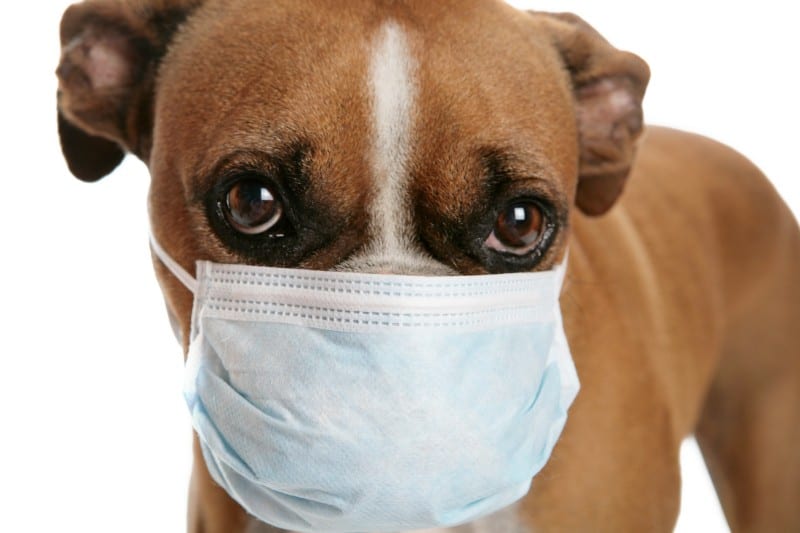What Could be Worse than Canine Flu? Not Much!

Canine influenza, or dog flu, is a highly contagious airborne condition that can affect all dogs regardless of breed, age, or health. Nearly all cases of canine flu result from indoor group, boarding facility, play centers, groomers, and dog parks.
However, with increased owner awareness, stricter policies at shared spaces, and the widespread availability of the canine influenza vaccine, dogs have a greater chance of avoiding this virus.
Year-Round Risk
There is no “flu season” for canine flu, and it can spread quickly. There are two strains of canine flu that cause serious respiratory infections: H3N8 and H3N2. The first strain, H3N8, was discovered in 2004 following an outbreak at a Greyhound racetrack in Florida. Originally an equine disease, H3N8 spread to dogs in 30 other states in just 5 years. It’s shed by infected dogs for 5 days.
In March 2015, the Chicago area witnessed hundreds of dogs suffering from respiratory disease. The virus was identified as avian flu strain H3N2, which originated in Asia. This strain is particularly challenging because the shedding period is intermittent over a period of up to 24 days. Unlike H3N8, H3N2 can also infect cats.
Immunity to Canine Flu
Dogs do not have any natural immunity to canine flu because it’s relatively new. Plus, because it spreads so quickly, all dogs are at risk.
Dogs in shelters and those who visit boarding facilities, salons/groomers, dog parks, and other play areas are at higher risk. Dogs who travel across state lines can also easily spread the virus and become infected.
Awareness Counts
To keep our animal guests safe and healthy, required proof of the canine flu vaccine is a major part of our boarding, grooming, and playcare check-in protocols. Because it’s so contagious and can spread so easily among indoor groups, we want to ensure all our guests are protected. Similarly, we don’t want to unknowingly help the virus spread.
Dangers of Dog Flu
The symptoms of canine influenza affect the respiratory system and can range from mild to severe. Please contact us immediately if you observe the following:
- Fever
- Coughing
- Discharge from the eyes or nose
- Lethargy
- Reduced appetite
Unfortunately, the canine flu can also be fatal. Keep an eye on your dogs and act quickly if you notice any symptoms. Depending on the strain, the virus will be shed for several days or even weeks through airborne nasal secretions. Direct contact with an infected dog should be avoided. Surfaces that may be contaminated, like floors, bowls, toys, and beds, should also be disinfected. Every precaution should be taken to remove germs from human hands, clothing, and household objects.
Sick pets should be isolated from other household pets.
Taking it Easy
Symptoms of canine flu can be eased with fluids, supplemental feeding, and medication. Hospitalization is sometimes required.
As with most conditions, prevention is the most effective approach to minimizing the effects of canine influenza. If you have additional questions about our policies or about dog flu, please let us know. The staff members at Animal Medical Hospital & Urgent Care are always here for you and your pet!
